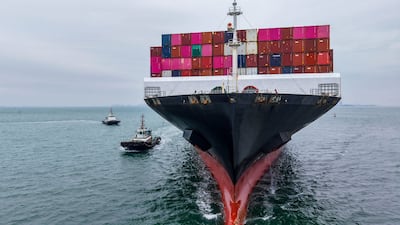A majority of countries at the International Maritime Organisation voted on Friday to postpone by a year a decision to adopt a global carbon price for shipping, after negotiations collapsed under US pressure.
More than 100 member states of the London-based UN shipping agency had gathered to finalise a deal agreed in April that would have made shipping the first global industry subject to a carbon pricing system aimed at cutting greenhouse gas emissions.
The proposal was expected to generate billions of dollars annually for climate initiatives and accelerate decarbonisation across the sector, which accounts for nearly 3 per cent of global emissions.
However, the IMO said the vote had been deferred to next year after the US delegation mounted a week-long campaign warning countries against supporting the measure.
Saudi Arabia, one of the world's two largest oil producers, also strongly opposed the carbon tax.
After days of disagreements, Saudi Arabia tabled a motion on Friday to defer discussions for one year, which was passed by a simple majority of 57 countries and opposed by 49 who sought to continue with a deal.
US President Donald Trump on Thursday denounced the initiative as a “green scam”, threatening sanctions and tariffs on nations that backed what Washington described as an attempt by the UN to impose a global carbon tax.
“We will not allow the UN to tax American citizens and companies,” US Secretary of State Marco Rubio said on X on Thursday. “The US will be a hard no. We call on other nations to stand alongside the United States in defence of their sovereignty.”
The vote dealt a blow to climate advocates and European nations including Brazil, which had championed the carbon levy as a cornerstone of the shipping industry’s transition towards net-zero emissions by 2050.
US ambassador to the UN Mike Waltz said on X that the IMO’s “carbon tax activism” was “absolutely unacceptable”.
The UN agency, he argued, “exists to set international standards for shipping safety and ports, NOT to impose billions in fines for a climate agenda that will be passed on to hardworking consumers”.
But climate advocates slammed the IMO's decision, calling it a “major setback” for the planet.
“It’s disgraceful that climate action has been delayed when we see the devastating impacts every day, and when shipping fuels have been tied to 250,000 premature deaths and six million cases of childhood asthma every year,” Delaine McCullough, Ocean Conservancy’s shipping programme director, said.
“The agreement would have slashed carbon emissions and saved lives.”
UN spokesman Stephane Dujarric said the decision was a “missed opportunity”.
“The shipping sector, central to our global economy, is responsible for about 3 per cent of global emissions, so the decarbonisation of that sector is critical,” Mr Dujarric told reporters in New York
Arsenio Dominguez, the IMO's Secretary General, admitted the charged atmosphere on Friday was not normal for the proceedings of the UN body.
For a start, the conclusion with a vote that left winners and losers undercut the usual emphasis on consensus.
“Yes, there is a division, it was clear on the result of the vote today,” Mr Dominguez said. “Geopolitical situations in general are, of course, having an effect in the way we do business at the IMO and you can take it not only for what is happening here but also situations in the Red Sea as well.”
Despite the decision to delay adoption of the proposed framework, he said work on the proposal would go on.
“I don't see it as a blow to the organisation,” he said, adding the decarbonisation goals of the 2023 deal on greenhouse gases are still in place.
“The goals in the 2023 IMO agenda remain in there as indicative goals.”
He added that the best way forward is one single global measure instead of a myriad from nations and regions.
In response to a report in The National this week that Polish Foreign Minister Radek Sikorski called for IMO intervention against dark fleet activity, involving tankers shipping sanctioned oil, in the North Sea, Mr Dominguez said the issue would be considered next month.
“We have started to review the legal framework that we have to address substandard shipping, that will address at the same time the dark and shadow fleet.”

